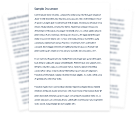Non-Disclosure Agreement (Mutual)
A Non-Disclosure Agreement (Mutual) allows you and another party to share confidential information while legally forbidding either party from disclosing that information to any other person or entity.
4.6 (362 reviews)
Last updated May 28, 2025
Under 5 minutes
Suitable for Australia
Written by Edwin Montoya Zorrilla
Reviewed by Damin Murdock
Document Overview
Protecting confidential information is crucial for any business, especially when it comes to sensitive material such as trade secrets, client information, or intellectual property.
Non-Disclosure Agreements (NDAs) are crucial legal documents that protect sensitive information and prevent its unauthorised use or disclosure.
A Non-Disclosure Agreement (Mutual) is a two-way legal document that you can use to disclose confidential information to a receiving party while legally forbidding either party from disclosing that information to any third parties, be they a person or entity.
It is important to note that this document is only enforceable if it is signed by you and the other party before information is shared. If you are seeking to protect the information of one party, see our Non-Disclosure Agreement (One-Way).
The Legal Risk Score of a Non-Disclosure Agreement (Mutual) Template
Our legal team have marked this document as low risk considering:
- There is a risk that confidential information may be inadvertently disclosed by one party, potentially leading to financial or reputational damage.
- Information might be wrongly classified as non-confidential, either due to misunderstanding or oversight, which could lead to unauthorized use or disclosure.
- The agreement specifies a jurisdiction that will govern the agreement and handle disputes, which might not be favorable or convenient for all parties involved, potentially leading to complications in legal proceedings.

Non-Disclosure Agreement (Mutual) Checklist
Complete your free Non-Disclosure Agreement (Mutual) with our checklist
Verify Signature Compliance
Ensure that all parties have signed the agreement in accordance with section 127 of the Corporations Act 2001, as outlined under the execution clauses.
Deliver Original Copies
Each party must deliver an executed original copy of the agreement to the other party within 10 business days after delivering a facsimile or electronic counterpart, as specified in the document.
Maintain Confidentiality and Security Measures
Take all reasonable precautions to maintain the confidentiality of the information and prevent unauthorized disclosure or use, as required by the operative provisions of the agreement.
Monitor and Notify
Regularly monitor the handling of confidential information and immediately notify the other party of any unauthorized disclosure or use, as stipulated in the agreement.
What does the Non-Disclosure Agreement (Mutual) cover?
- A description of the confidential information;
- Confidential rights and obligations of the parties;
- Protection of sensitive information;
- Return of confidential information at the end of the agreement;
- Obligations regarding proper use of the information; and
- Circumstances where disclosure is permitted.
Who should you use a mutual NDA with?
You should use a mutual NDA when dealing with the following people:
- Distributors
- Investors
- Manufacturers
- New owners when IP is transferred
- Potential business partners
What are the other names for a Non-Disclosure Agreement?
A non-disclosure agreement can also be referred to as an:
- NDA;
- Confidentiality Agreement;
- Confidential Disclosure Agreement (CDA);
- Proprietary Information Agreement (PIA);
- Secrecy Agreement (SA);
- Confidentiality Contract; and
- Gag Order.
Use this Non-Disclosure Agreement (Mutual) if:
- You would like to disclose confidential information in a negotiation and want it not be in the public domain (ie. competitors, successors);
- You would like to put restrictions on the use of confidential information;
- You would like to maintain secrecy of information when working with contractors or potential investors;
- You would access confidential information that belongs to someone else; and
- You would like to protect confidential information including intellectual property, financial projections, customer lists and trade secrets.
FAQs
Are NDAs legally binding in Australia?
Yes, Non-Disclosure Agreements (NDAs), also known as confidentiality agreements, are legally binding in Australia. These agreements are commonly used to protect sensitive information, trade secrets, or proprietary data shared between parties. In Australia, as in many other jurisdictions, an NDA is a legally recognised contract that outlines the terms and conditions under which confidential information can be shared and used.
What happens if a Non-Disclosure Agreement is breached?
If there is a breach of this agreement and there is disclosure of confidential information within the agreed non-disclosure period you are able to claim a remedy or damages from the violating party. These are outlined in the provisions of this agreement, some of the specifications include:
- injunctive relief;
- damage for loss;
- court order; and
- termination of employment.
What type of information can be covered in a Non-Disclosure Agreement?
The subject matter of the NDA can be as broad or as narrow as necessary to suit to your needs. You can use this Lawpath template as a base and then customise the document accordingly. Common terms of this agreement and information that can be covered is inclusive of but not exhaustive to:
- patents;
- copyrights;
- financial information;
- customer lists; and
- trade secrets.
How long is a Non-Disclosure Agreement effective for?
It is not an essential element of a non-disclosure agreement to give a specific time-frame. However, we recommended that an obligation of confidentiality remain until the information is no longer classified as confidential and enters the public domain. In cases where the parties decide to agree on a time-limit, to ensure enforceability, the deadline must not go over what is reasonably necessary to protect the legitimate interests of your business.
Will my Non-Disclosure Agreement be enforceable overseas?
This document is only enforceable in the country or state specified in the agreement. If you intend to take legal action to enforce this agreement or seek remedies for its breach, you will need to do so in the State or Territory Court the document was executed in. However, the applicability of the NDA is a separate matter- generally speaking, this agreement binds both parties in their actions, whether those actions take place in Australia or overseas.
What are termination terms in an NDA?
You should be mindful of the specific termination terms of the agreement. According to the terms, information received after a certain date or event has passed may not be confidential information. This may be specified in the question regarding the nature of the confidential information being disclosed by each party.
Let’s say you sign an NDA during the course of employment, but after leaving the job, the NDA continues to apply for a certain amount of time (e.g. 1-year post-employment). While you are bound by this ongoing obligation, it is unlikely that the NDA will bind you to keep confidential any information you learn after leaving your position.
Other documents you may need:
- Non-Disclosure Agreement (One-Way)
- Full Time Employment Agreement (Long Form)
- Confidentiality Policy
- Heads of Agreement
- Intellectual Property Agreement
Further information
- Can I issue a Non-Disclosure Agreement (NDA) for Past Information?
- What Happens If There Is A Privacy Breach Of NDA Information?
- Top 5 Enforceability Issues For NDAs
- What Is the Difference Between Privacy and Confidentiality in Australia?
- 10 Things To Know About Non-Disclosure Agreements
- Should You Use A Mutual or One-Way NDA?
View Sample Non-Disclosure Agreement (Mutual)
It's never been so easy
Sign-up to a free Lawpath account
Get started and we'll take care of you. It's that easy.
Browse our 500+ legal documents
Browse our 500+ legal documents to find the perfect match to cover your business needs. We've got Compliance, Employment, Service agreements and more.
Collaborate with e-Sign and Sharing
Having access to your legal documents has never been easier. You can request e-signature, share the document and download for an efficient collaboration.
Create unlimited legal documents and eSignatures for only $39/month.
Upgrade to a Lawpath legal plan to boost your new business.


Here's what people say about Lawpath's Non-Disclosure Agreement (Mutual)
Reviews are managed by BazaarVoice and comply with the BazaarVoice Authenticity Policy. Reviews are independently verified by BazaarVoice and detail our customers' real experiences.
0 reviews
Most Recent
Highest to Lowest Rating
Lowest to Highest Rating

